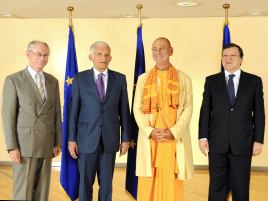European Commission And Religions: Fighting Poverty Together
By Krishna-lila Dasi | Jul 25, 2010

For Monday, 19th of July in Brussels, José Manuel Barroso, President of the European Commission, Jerzy Buzek, President of the European Parliament and Herman Van Rompuy, President of the European Council, brought together twenty five European religious leaders to discuss how to combat poverty and social exclusion. In the group of Anglican, Roman Catholic, Jewish, Islam, Reformed, Sikh and Orthodox leaders the Hindu communities were represented by Sivarama Swami governing body commissioner of ISKCON.
In his opening address, Jose Manuel Barosso pointed out: “The harsh reality is that today more than 80 million of our European citizens are living at or below the poverty line. This fact cannot be accepted, especially that the EU is one of the world richest regions. Today we invite you to address one of our most pressing challenges, combating poverty and social exclusion.”
Jerzy Buzek, President of the European Parliament, added: “Solidarity is directed towards recognizing the inherent human dignity of the poor and marginalized as the measure of a fair and just society. We are all God’s children. The promise of a better life for all, starting with the most vulnerable, must always be at the heart of the European political project.”
According to the decision of the EU`s governing institutions, 2010 is the European year against poverty and social exclusion. One of the objectives of the strategy is to reduce by 25% the number of Europeans exposed to poverty and social exclusion by 2020. In order to achieve this the EU Commission proposes a set of measures devised to work simultaneously across a wide range of policy measures: by striving to create more and better quality jobs; invest more in education, life long learning and requalification of the unemployed; ensure equal and fair access to education, social protection and health care systems.
As part of the strategy of fighting poverty and integrating the most vulnerable into the mainstream society, the EU is counting on the help of the religious communities. Being aware that defining the relationship between political power and the faith communities has always been a very sensitive issue in modern Europe, Jerzy Buzek emphasized:
“In the European Union, and in our Member States, we have a clear separation of church and state. Each has its own area of activity; this constitutional separation helps assure religious freedom – freedom from interference in administrative and theological matters. The Lisbon Treaty follows this tradition. Article 17 goes on to recognize the specific contribution that religions make to our society. This year’s annual gathering is the first to take place since the Lisbon Treaty entered into force. The dialogue between the EU institutions and Europe’s churches and religions is now a legal obligation. The European Parliament is keen to play its part in the dialogue.”
Answering the call by the leaders of the EU institutions, the religious representatives offered several solutions unique to their respective spiritual approaches.
According to ISKCON-leader Sivarama Swami, the root of the poverty problem is the unbalance between the demand and the supply. “The European Union does not have the supply to provide everyone the same competition-driven lifestyle the average German and French have. We need to simplify our demands, bring them down to the necessities of life. There has to be a direct connection between how people work and get their food. Curbing the consumer mentality will provide a mass of people with nourishment, shelter, work and human integrity in a sustainable way.”
Sivarama Swami also presented the example of the Krishna-valley farm community in Hungary, where the ecological footprint is well below the European average. His recommendation that the EU supports spirituality-centered communities that are based on and promote sustainability was welcomed by the EU leaders.















